
Every day is a good day to point out that 92% of Reform's donations were found to come from figures and groups linked to the fossil fuel industry. @desmog.com
12.10.2025 08:45 — 👍 891 🔁 503 💬 24 📌 31@martinakavan.bsky.social
Thinking about heat pumps, energy and decarbonisation at @nestauk.bsky.social

Every day is a good day to point out that 92% of Reform's donations were found to come from figures and groups linked to the fossil fuel industry. @desmog.com
12.10.2025 08:45 — 👍 891 🔁 503 💬 24 📌 31
It's an advisory ruling, but opens the door for more climate lawsuits.
And all started by a group of law students - Pacific Islands Students Fighting Climate Change. 🥊
"Failure to take appropriate action [...], including through the production and consumption of fossil fuels, the granting of fossil fuel exploration licences or the provision of fossil fuel subsidies, “may constitute an international wrongful act which is attributable to that state”. "
❗

This week's big win 🎉 of the International Court of Justice ruling could change the way states approach NDCs.
What did ICJ say?
⚖️ States are obligated to protect the climate under international law
⚖️ They must adopt ambitions NDCs
⚖️ Failure to do so can trigger reparations to affected countries

There's been a lot of talk about Labour's £13.2bn Warm Homes Plan, which may or may not be confirmed in the spending review tomorrow.
But what is the £13.2bn for? My colleagues @tomleach.bsky.social and @martinakavan.bsky.social have written a nice explainer...
www.nesta.org.uk/blog/what-co...
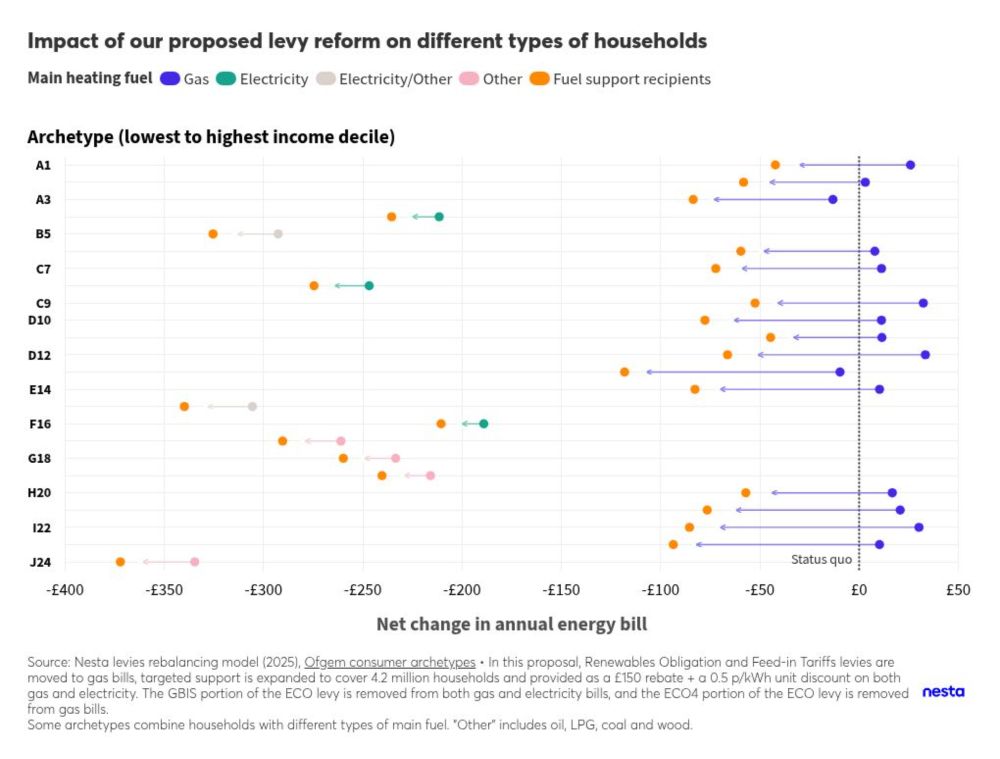
You can also play with this chart and see how moving levies to gas would affect different types of households.
public.flourish.studio/visualisatio...
(keeping in mind that under status quo, low-income households, and especially those who use electric heating, contribute disproportionately)
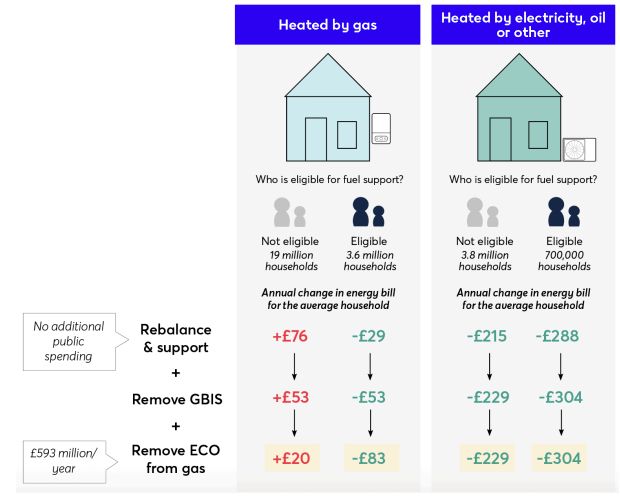
There are different ways to reduce levies on electricity. The last row here shows average changes in annual bill compared to today under our preferred solution:
Shifting levies from electricity to gas + moving ECO off gas bills + increasing fuel support

We've just published our work on reforming energy levies.
Current levies inflate electricity bills by ~20%, and favor fossil fuels over clean energy.
We project impacts of levy reform on a range of households and show that it's possible to make them both fairer and more climate friendly.

Overall our response to the fuel poverty consultation argues that:
1. Heat pumps needs to play a bigger role,
2. Rebalancing levies resolves the tension between net zero and affordability,
3. Schemes should move away from “worst first” and treat a lot more homes.
www.nesta.org.uk/blog/we-need...
Our take at @nestauk.bsky.social is that making electricity cheaper is necessary in making any fuel poverty strategy sustainable (ie. aligned with net zero).
Without cheap electricity, it is still difficult to fund heat pumps for gas-using low-income households and promise reliable savings.
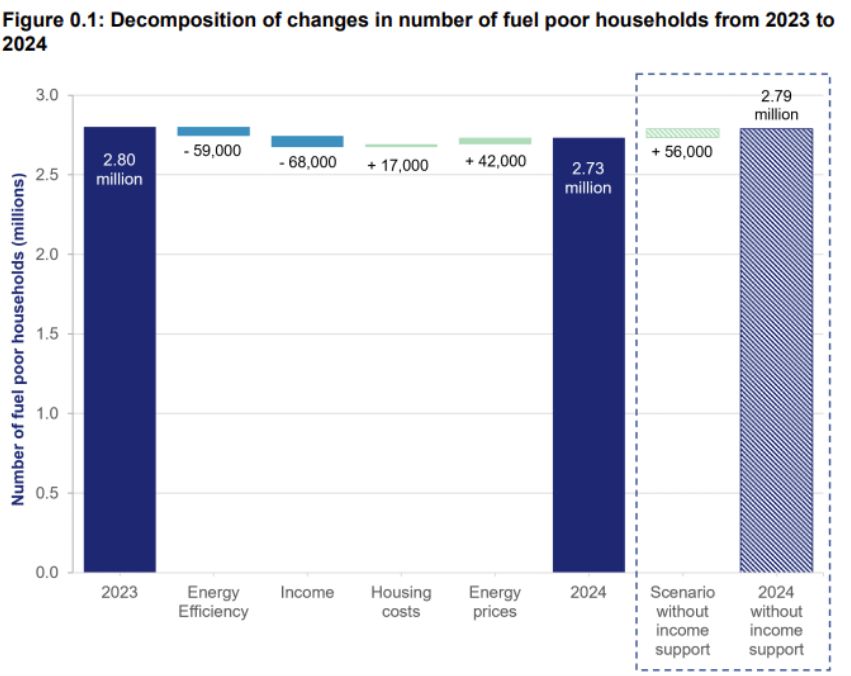
Government recently consulted on a new fuel poverty strategy for England. Recognizing that what they're doing now isn't making much of a dent in the problem.
Asking questions like "How should we implement the sustainability principle".

I wrote a blog on the role of electricity prices in helping people in fuel poverty.
These are two illustrative scenarios I used to describe the long-term effects of cheap/expensive electricity on public spending and fuel poverty:
🧵
What if we had no electricity and everything ran on fossil fuels?
This ad keeps making me chuckle.
Enjoy if you have not seen it or rewatch as it is just gold!

The ratio of electricity to gas needs to drop to well below 3.5 and stay there, otherwise mass electrification won't happen because electricity won't be a good deal.
Chart from:
www.nesta.org.uk/blog/fixing-...
Electricity needs to get cheaper, but realistically, low gas prices will also threaten the transition to clean energy.
If we added levies to the price of gas, the wholesale component (currently 58%) would play a relatively smaller role. Cheap gas wouldn't affect the price ratio as much.
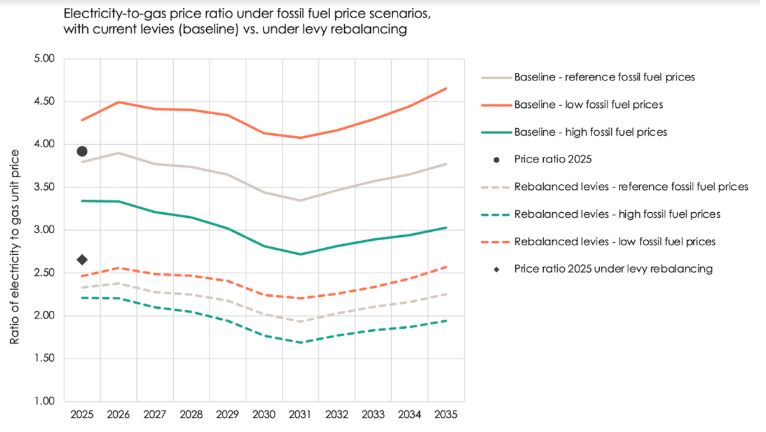
Moving levies from electricity to gas would protect decarbonisation efforts from volatility in gas prices. 📉 This chart shows the future electricity-to-gas price ratio (key metric for incentivizing electrification) under wholesale price scenarios with (full lines) and without (dashed) rebalancing.
30.04.2025 14:05 — 👍 7 🔁 1 💬 2 📌 2I'm afraid it'd have to scale up substantially. Levies paid per unit are currently calculated by estimating the total UK consumption in kWh and dividing the revenue needed by that. If the revenue was covered only from a portion of total consumption, levy rate would need to increase by quite a lot
30.04.2025 13:51 — 👍 0 🔁 0 💬 1 📌 0So it would have the same negative effect on the average household while not delivering as big an incentive for larger households on gas to switch (because gas prices would remain the same)?
The good bonus is that it'd massively help fuel-poor households with direct electric heating.
Interesting, so what you're suggesting is the opposite of a rising block tariff. My first thoughts are that you'd have to increase the levy per kWh (maybe triple?) so much that it might disproportionately hit low-income households with low consumption.
27.04.2025 17:49 — 👍 1 🔁 0 💬 2 📌 0
Making electricity cheaper by shifting the unfair levies away from bills isn’t just good climate policy, it’s good value for money.
Full @nestauk.bsky.social blog here:
The @thecccuk.bsky.social advises ~440,000 heat pump installations in 2030. With a £6k grant for each, the government would pay £2.65bn.
With a £2k grant under levy rebalancing, it's just £880m. A difference of £1.8bn/year.
Not rebalancing levies could cost extra £13.8bn over the next parliament.
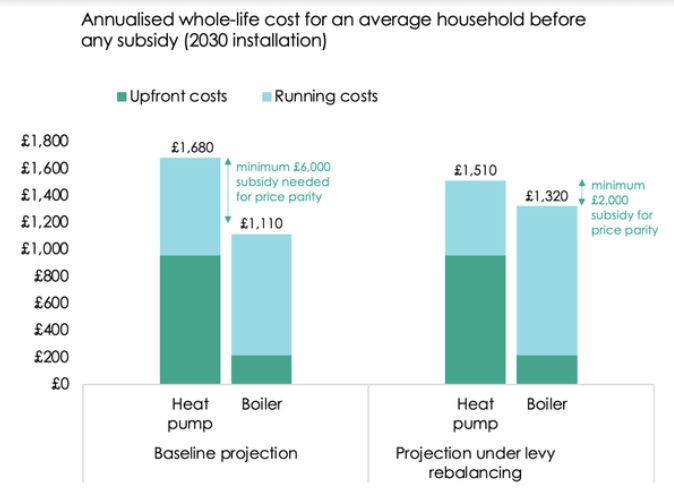
By 2030 without rebalancing levies, BUS would need to be at £6,000 to maintain price parity between heat pumps and boilers.
On the other hand, if levies are rebalanced, £2,000 should be enough for the average household.
(chart shows annualised costs over 15 years)
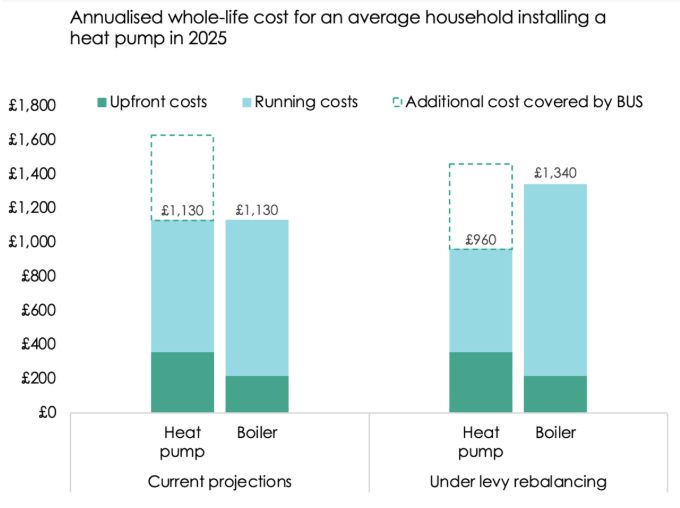
Moving the majority of levies from electricity to gas bills would bring the ratio of electricity to gas prices from 3.9 to 2.7. And it would technically cost the government nothing.
Heat pump owners would pay on avg. £380/year less than households on gas, even including upfront costs and interest.
The current £7,500 BUS brings the total cost of having a heat pump on average down to the level of a gas boiler.
But if homeowners could save hundreds of £ on energy, they wouldn't need such high subsidies on upfront costs.
Electricity needs to get cheaper relative to gas.
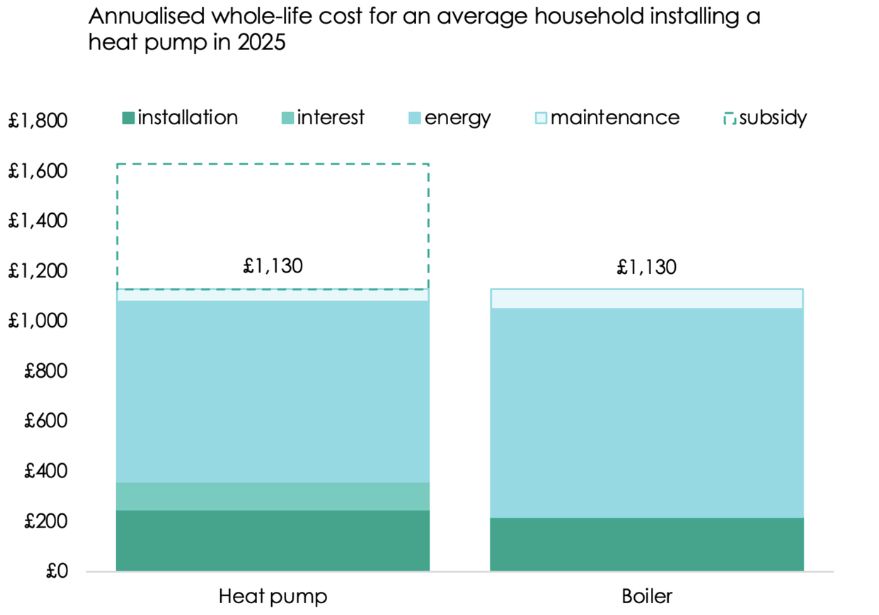
Fixing electricity pricing is urgent. Without it, decarbonisation stalls and gov will need to spend billions more on subsidies.
I wrote a blog explaining the role of energy levies in the total cost of heat pumps. 🧵🔽
This chart shows the projected annual costs over 15 years under status quo:

Thank you to all reporters who call out anti net zero bullshit.
A great cheat sheet for the likes of "UK is only responsible for 1% of global emissions and so can slow down". ("A @carbonbrief.org analysis in 2021 found that the UK was the eighth largest country in terms of cumulative emissions.")

The U.S. Department of Defense is ending all of its funding for social science research, stopping 91 ongoing studies related to threats such as climate change, extremism, and disinformation.
Oh, this will age so, so badly:
"The DOD does not do climate change crap.
We do training and warfighting."
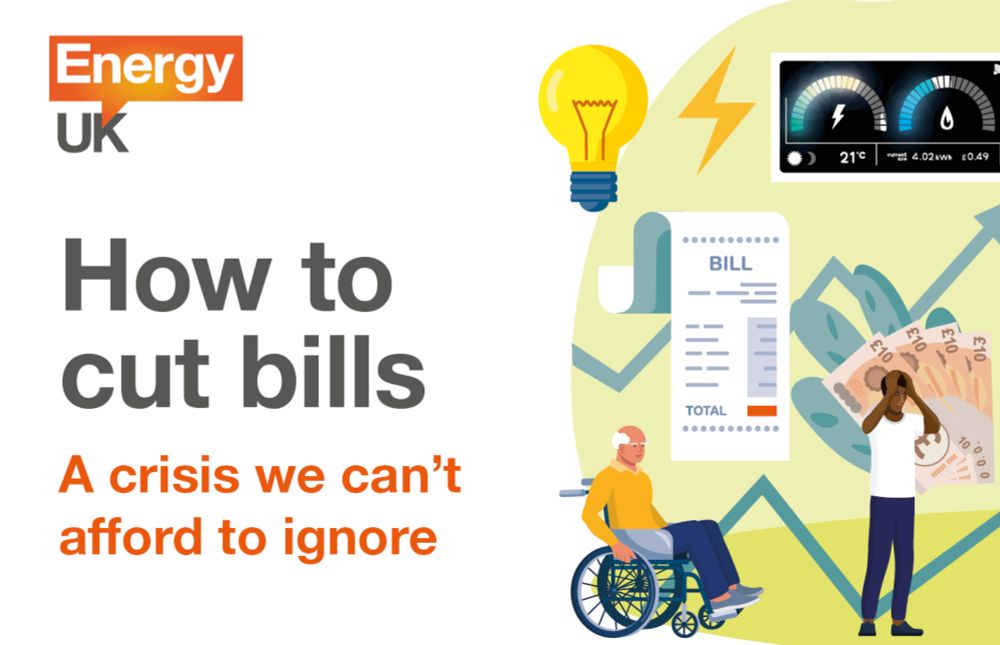
Better bill support for vulnerable households will require about £1bn/year extra spending and breaking down barriers to data sharing between departments and energy companies so that those who need it most can get help.
Transitioning away from gas will then lower bills in the long term.
But removing levies would be very expensive for the government. Schemes funded through bills cost £1bn-£6bn in total/year.
A more nuanced solution is to shift some levies from electricity to gas bills, and use public money to reduce bills for vulnerable households only, in a more targeted way.
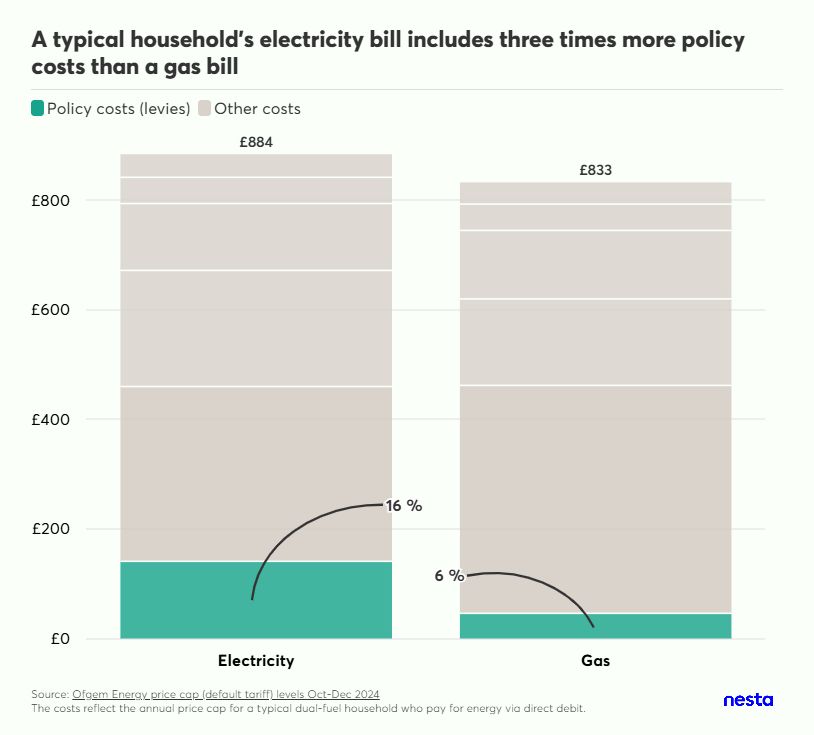
Removing policy levies from electricity bills is highlighted in the mix of solutions. It would save hundreds of pounds to the 4.5 million electrically heated households, and would create a big incentive to switch to a heat pump.
( @nestauk.bsky.social chart from www.nesta.org.uk/project/find...)